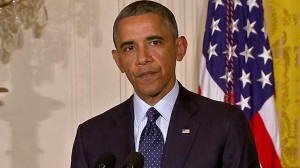 President Obama’s decision to push back key provisions of his signature healthcare law amid growing concerns it isn’t ready for prime time could take a key issue away from Republicans in next year’s midterm elections.
President Obama’s decision to push back key provisions of his signature healthcare law amid growing concerns it isn’t ready for prime time could take a key issue away from Republicans in next year’s midterm elections.
The announcement Tuesday night that the mandate for many small businesses to provide health insurance to employees will be delayed by one year was hailed by business leaders and seemed to acknowledge Republican claims the plan would hurt – or at least confuse – business. But it also likely undercuts Republican plans to make ObamaCare the centerpiece of their midterm elections strategy.
Democrats are defending 21 Senate seats to the Republicans’ 14. The GOP had already started to excoriate Senate Democrats who had voted for the health law in 2009. And the House has voted more than 35 times since taking control of the chamber in 2011 to repeal or at least defund all or parts of ObamaCare, most recently in May.
“The president’s health care law is already raising costs and costing jobs,” House Speaker John Boehner said. “This announcement means even the Obama administration knows the ‘train wreck’ will only get worse. … And it underscores the need to repeal the law and replace it with effective, patient-centered reforms.”
The announcement was made late Tuesday by the Treasury Department, at the beginning of the holiday week while Congress was on recess. It came amid reports that the administration is running into roadblocks as it prepares to implement ObamaCare.
The change in the employer mandate also is arguably the most significant concession the administration has made to date to critics of the plan.
“We have heard concerns about the complexity of the requirements and the need for more time to implement them effectively,” Treasury Assistant Secretary Mark Mazur said in a blog post. “We have listened to your feedback and we are taking action.”
Randy Johnson, senior vice president of Labor, Immigration, and Employee Benefits at the Chamber of Commerce, told Fox News the administration’s decision shows it has “finally recognized the obvious.”
“Employers need more time and clarification of the rules of the road before implementing the employer mandate,” he said. “We will continue to work to alleviate this and other problems with ObamaCare.”
Neil Trautwein, a vice president of the National Retail Federation, said: “We commend the administration’s wise move.”
He also said the change “will provide employers and businesses more time to update their health care coverage without threat of arbitrary punishment.”
But the delay could also undermine the law’s main goal of covering the nearly 50 million Americans without health insurance. Already, Republican resistance in the states will deny access to a planned Medicaid expansion — at least for next year — to millions of low-income people.
Under the health law, companies with 50 or more workers must provide affordable coverage to their full-time employees or risk a series of escalating tax penalties if just one worker ends up getting government-subsidized insurance. Originally, that requirement was supposed to take effect Jan. 1. It will now be delayed to 2015.
Most medium-sized and large businesses already offer health insurance and the requirement was expected to have the biggest consequences for major chain hotels, restaurants and retail stores that employ many low-wage workers. Some had threatened to cut workers’ hours, and others said they were putting off hiring.
Business groups complained since the law passed that the provision was too complicated. For instance, the law created a new definition of full-time workers, those putting in 30 hours or more. It also included two separate requirements, one to provide coverage and another that coverage be deemed “affordable” under the law. Violations of either one exposed employers to fines. But such complaints until now seemed to be going unheeded.
There is no coverage mandate — or penalty — for smaller businesses. Also, for businesses of any size, there is no penalty if their workers are poor enough to be eligible for Medicaid.
The delay in the employer requirement does not affect the law’s requirement that individuals carry health insurance starting next year or face fines. That so-called individual mandate was challenged all the way to the Supreme Court, which ruled last year that the individual requirement was constitutional, since the penalty would be collected by the Internal Revenue Service and amounted to a tax.
Sen. John Barrasso, R-Wyo., a critic of the law, seized on the delay as a “clear admission” that the law is “unaffordable, unworkable and unpopular,” but conceded delaying implementation could help Democrats.
“It’s also a cynical political ploy to delay the coming train wreck associated with ObamaCare until after the 2014 elections,” he said.

Leave a Reply